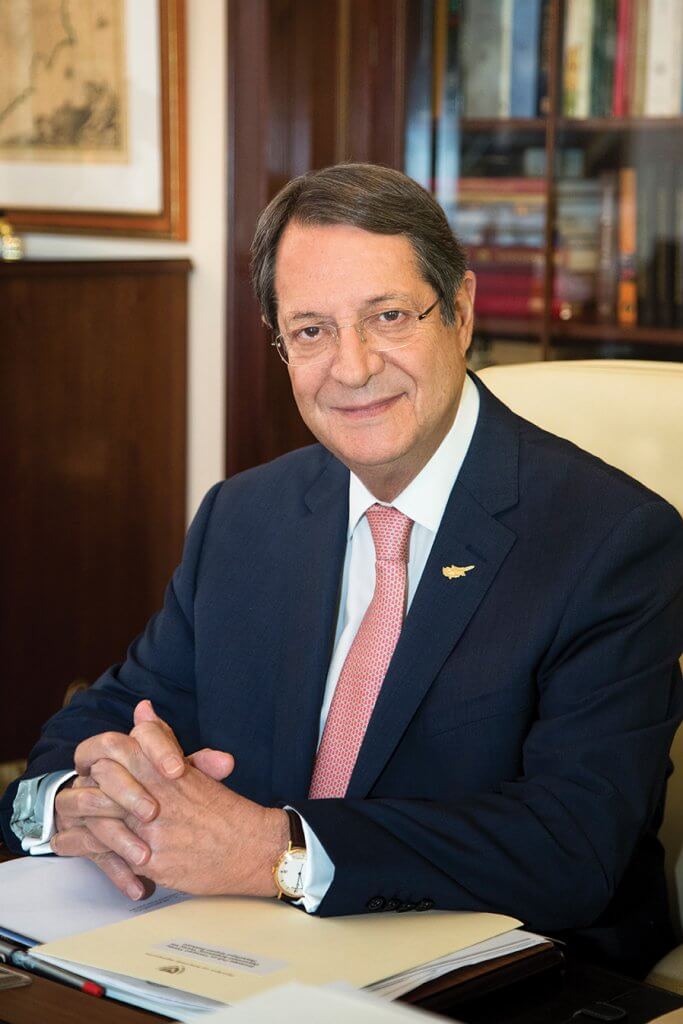The President of Cyprus Mr. Nicos Anastasiades. Аbout life, politics and himself

How did you decide to become a politician?
Ever since my childhood, I had an instinctive urge to become involved in the decision-making processes that affect our daily lives. During secondary school, I participated in the student committee of my class and, later on, while studying law, I was actively involved in the Student Union of my University. When I finished my studies and started my law practice, I became a member of various organisations. In 1976, I joined the Cyprus political life as a founding member of the Democratic Rally and the Youth of the Democratic Rally. So, for more than forty years, I have been formally and actively involved in the political life of Cyprus.
What main skills and knowledge should a politician have?
A politician should be sincere, ready to listen to people and be on top of things. It is essential to be honest and to be able to reach out to the people; to be trustworthy and reliable. A responsible politician strives to serve and help the people, not his or her ambitions. A good politician needs to take on difficult and sometimes painful decisions and, in this respect, he or she should be able to accept responsibility for his actions and his words.
How do you define success and how do you measure up to your own definition?
In one sentence: To reach the goals that you set and to see your vision transform into reality.
Before taking up office, and during the electoral campaign, I announced a very ambitious and thorough reform programme. Nonetheless, I was elected president of a nearly bankrupt state and I had to make some very difficult and unpopular decisions. Owing to the hard work of our people and the responsibility that the government, the political parties and social partners exhibited, and against expectations, we succeeded not only in stabilising the economy, but, most importantly, in registering positive economic growth; a growth stronger and faster than anyone expected.
What is one characteristic that you believe every leader should possess?
He should lead the people, always taking into consideration their best interests.
What experiences have you had while serving as president?
Disappointments, firstly, given the hurdles that I have had to face since I undertook this post. For example, the Eurogroup meeting in March 2013 was the worst experience I ever had. I am also disappointed about the results from the tremendous effort that we made to reach a settlement of the Cyprus problem. The other negative experience is bureaucracy; when you want to act quickly and see immediate and practical results, but you cannot move forward due to trivialities.
Now, facing the realities, you have to be committed to overcoming the problems and to be decisive in taking the necessary steps. Of course, it is not just up to the governmental side. We have a presidential system, so the cooperation of the House of Representatives is imperative. Six major reforms, so far, have been rejected by the House of Representatives. Now, we have engaged in a dialogue with the House, aiming at moving forward the draft bills in order to implement the reforms.
How do you personally handle criticism?
After so many years in politics, I found out that it was wise that God gave us two ears; one to listen and the other one to discard whatever is not needed to be kept. I have enough patience and I am not keen on engaging in unnecessary and pointless confrontations with my opponents. On the other hand, I do not accept unfounded criticism that is a result of populism. I believe that one of my good features is self-criticism. You have to accept and contemplate on criticism, otherwise you will not be able to acknowledge and correct your mistakes.
Have you ever fought for a political cause?
The moment I took office, I was informed that the cash flow of the country was barely enough to pay salaries for one month and following the first Eurogroup meeting and the decision to levy a tax of 6.7% on deposits under €100,000 and 9.9% on all deposits over €1,000,000, despite my efforts, the House of Representatives rejected the first decision of the group and, unfortunately, the second one was the imposed bailin, leading to the subsequent collapse of Laiki Bank and numerous other negative consequences.
When have you been most satisfied in your life?
I am blessed enough to have had many happy milestones in my life. Having my children and grandchildren, having good friends, becoming President of the Democratic Rally and elected President of the Republic and many other moments are all included. One thing that satisfied me the most during my tenure as President was that we managed, much faster than any predictions, to stabilise the country after the bail in, when we received an almost bankrupt country. Now, we have reached a growth rate of almost 3.5%.
What is the most interesting thing about you that we still do not know?
I am like every other human being. I hate protocol! I prefer those who call me by my first name, not those who call me Mr. President. Sometimes, I miss the life I used to have, as I had more free time.
Can you name three main problems facing Cyprus today and the strategies to solve them?
The very first is the national question of Cyprus. The second is youth unemployment, which is declining, but still remains a big problem and the third one is reforms that we have to conclude in order to preserve and strengthen Cyprus’ position as an excellent place to live, to do business, to invest and to prosper.
What is your greatest hope?
To see my country united and to see my people, Greek and Turkish Cypriots, once again living together in peace.









